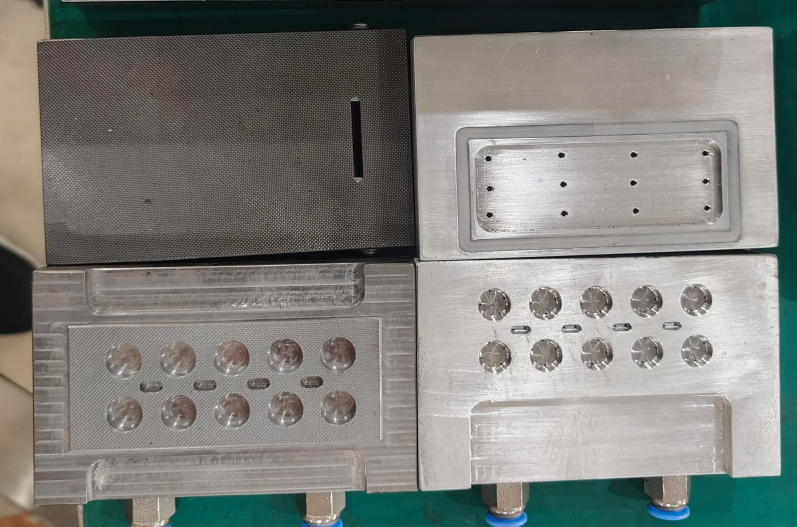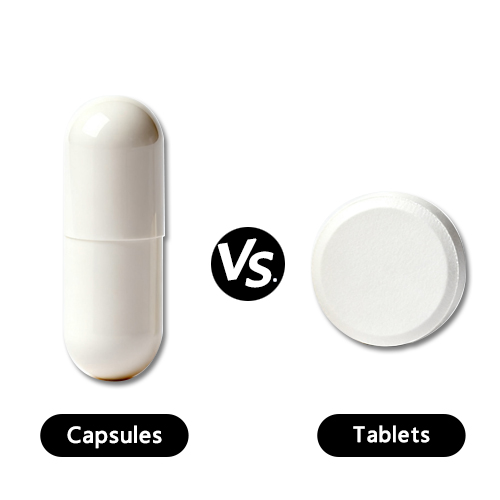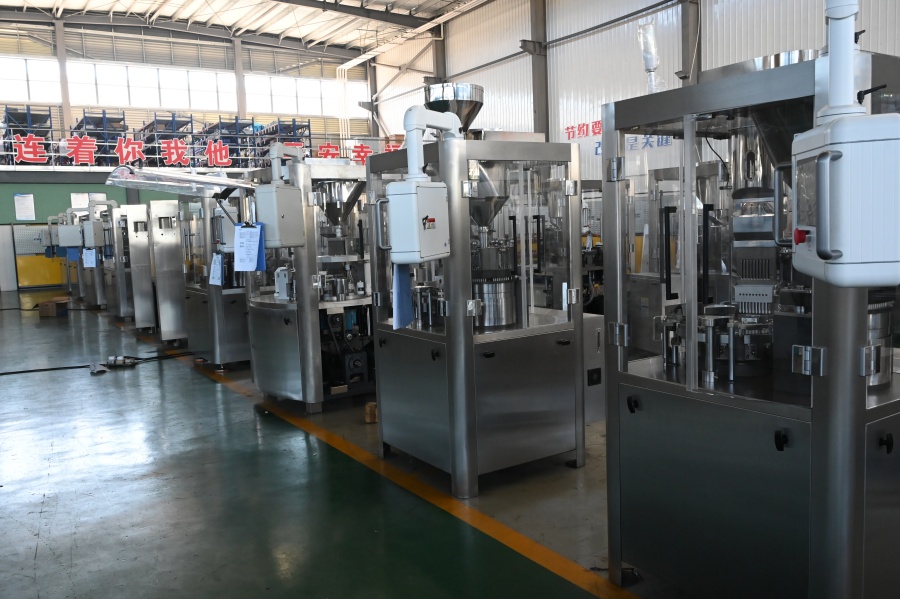In pharmaceutical manufacturing, the choice between capsules and tablets is more than a matter of tradition or appearance.
Both look simple, yet they carry subtle differences that can impact how your body absorbs medicines, how fast it works, and even how easy it is to swallow. Capsules often feel sleek and modern, while tablets carry that old-school reliability.
However, the choice should be based on effectiveness, not appearance. So, let’s break it down and settle the capsules vs tablets debate once and for all.
What Are Capsules?

Capsules are small, easy-to-swallow containers that hold medicine or supplements. They usually come in a smooth, oval shape and are designed to make taking medication more comfortable, especially for people who struggle with traditional pills.
Instead of being compressed like tablets, capsules are filled with powder, liquid, or tiny beads of medicine.
Capsules are generally manufactured using specialized capsule filling equipment, and there is a universal capsule size chart from 000# to 5#.

Common Types of Capsules
Capsules come in different forms, with gelatin ones being the most commonly used. Here’s how these vary:
- Gelatin Capsules: The most common type, made from animal by-products. They are smooth, dissolve quickly, and are widely used for both prescription drugs and supplements.
Gelatin Capsules - Vegetarian Capsules: Made from plant-based ingredients like hydroxypropyl methylcellulose (HPMC). Perfect for people who avoid animal products.
Vegetarian Capsules - Liquid-Filled Capsules (Softgels): These are made with certain oils or fat-soluble ingredients. They are popular for vitamins like fish oil or vitamin D.
Liquid Filled Capsules
How Capsules Work Inside the Body
Capsules are designed to break down quickly once swallowed. The outer shell dissolves in the stomach or small intestine, releasing the medicine inside. This usually leads to faster absorption compared to some tablets, meaning the body gets the effect of the medicine sooner.
Pros and Cons of Capsules
| Pros | Cons |
| Easier to swallow due to their soft texture | Generally, it costs more to manufacture |
| Dissolves faster, which means quicker relief | Not ideal for very large doses |
| Can mask unpleasant tastes or odors of medicine | More sensitive to heat and humidity, reducing shelf life |
| Suitable for liquids, oils, and sensitive ingredients |
|
What Are Tablets?

Tablets are the most common form of medicine and supplements. They are made by compressing powdered ingredients into a solid, flat shape.
Tablets are widely used because they’re cheap to produce, easy to store, and available in many forms. Unlike capsules, tablets can be split or crushed if needed, which makes dosing more flexible.
Common Types of Tablets
Tablets typically don’t come in different forms. The only difference between them is how fast they act and how the patients take them. Some types that you’ll be manufacturing include:
- Standard Tablets: The basic form, swallowed whole with water.
Standard Tablets - Chewable Tablets: Designed to be chewed before swallowing, popular for children.
Chewable Tablets - Effervescent Tablets: Dissolve in water to make a fizzy drink, easier on the stomach.
Effervescent Tablets - Extended-Release Tablets: Release medicine slowly over time for long-lasting effects.
Extended-Release Tablets
How Tablets Work Inside the Body
When swallowed, tablets break down in the stomach through the action of digestive fluids. Some dissolve quickly, while others (like coated or extended-release tablets) take a longer time. This controlled breakdown helps regulate how and when the medicine is absorbed into the bloodstream.
Pros and Cons of Tablets
| Pros | Cons |
| Affordable and cost-effective to produce | May have a chalky taste or aftertaste |
| Longer shelf life compared to capsules | Can take longer to break down and start working |
| Can be split or crushed | Not always suitable for oils or heat-sensitive ingredients |
| Available in many different forms |
|
Capsule vs Tablets: Key Differences You Should Know

When choosing capsules vs tablets, there isn’t a one-size-fits-all answer. Both have strengths and weaknesses depending on cost, convenience, and personal preference. Here’s how they stack up against each other:
| Feature | Capsules | Tablets |
| Ease of Swallowing | Smooth and easier to swallow due to the gelatin or vegetarian coating | Often harder to swallow, especially larger tablets |
| Absorption Speed | Break down faster in the stomach, so they usually start working quicker | May take longer to dissolve, especially if coated or extended-release |
| Taste & Smell | Mask the taste and odor of medicine well | Can have a chalky taste or smell |
| Flexibility | Cannot usually be split or crushed | Many tablets can be split or crushed for flexible dosing |
| Cost | More expensive to produce, so often pricier | Cheaper to manufacture, making them widely available and affordable |
| Shelf Life | Shorter shelf life because gelatin can absorb moisture | Longer shelf life, making them easier to store |
| Special Formulas | Ideal for oils, probiotics, and sensitive ingredients | Great for chewables, effervescent, and slow-release formulas |
| Popularity | Often used for supplements and specific medications | Common and used worldwide |
A Quick Fact: According to Verified Market Reports, tablets hold the largest share of the global oral solid dosage market, at over 60%.
Which One Should You Choose?
The choice between capsules vs tablets depends on the formulation requirements, production efficiency, and market positioning.
Capsules are preferred when working with ingredients that are sensitive to compression and require faster dissolution. Tablets, however, remain the most effective dosage form, as they offer a longer shelf-life.
For manufacturers, the decision is not about personal preference, but about aligning dosage form with stability, bioavailability, cost, and patient adherence goals. As a matter of fact, 65% of consumers prefer capsules to tablets because they are easier to swallow, so you can base your decision on this, too.

Image Source: Market.us
Do Capsules or Tablets Work Faster in the Body?
Capsules generally work faster than tablets because they dissolve more quickly once they reach the stomach. The soft outer shell breaks down within minutes, allowing the medicine inside to be absorbed faster.
Tablets, on the other hand, need more time to disintegrate, especially if they’re coated or compressed tightly.
Studies also show that gelatin capsules dissolve in about 4 to 6 minutes, while some tablets take up to 30 minutes to break down. This difference can be significant if the patient requires rapid relief, such as with painkillers or allergy medication.
Are Capsules or Tablets Better for Sensitive Stomachs?
For people with sensitive stomachs, capsules are often the gentler choice. Because capsules dissolve faster, they spend less time in the stomach and reduce irritation. Many capsules can also be made with vegetarian shells that are easier to digest and free from common allergens.
Tablets, however, can sometimes be harder to break down, which may cause discomfort, bloating, or nausea in sensitive individuals. Coated tablets may be easier on the stomach, but they still take longer to dissolve.
According to research published by the National Institute of Health, 32% of the participants reported difficulty swallowing. This highlights the importance of making the dosage form more accessible for patients.
Ready to Simplify Drug Manufacturing?
At the end of the day, the capsule vs tablets debate isn’t just about what’s easier to swallow or gentler on the stomach; it’s about how successfully your business can produce both options to market. Many manufacturers struggle here, but not anymore.
With Finetech, you can produce capsules or tablets by using our advanced filling machines, rotary presses, and blister packaging solutions. As a leading pharmaceutical equipment supplier, we make the process simple.
So, if you’re ready for a smoother production line, contact Finetech today!
FAQs
1. Which is easier to swallow: capsules or tablets?
Capsules are often considered easier for patients to swallow due to their smooth shells which reduce friction and help them pass down the throat comfortably. Tablets, on the other hand, can be more challenging for patients, which is why their size and coating must be carefully designed during development.
2. Are capsules more expensive than tablets?
Often yes. Capsules can be more expensive to manufacture due to the cost of the shell material and the filling process. Tablets are usually cheaper since they are made from pressed powders. If cost is your main concern, tablets are the more budget-friendly choice. But capsules may offer easier digestion and quicker relief.
3. Which is better for vitamins: capsules or tablets?
Capsules are better for vitamins because they dissolve quickly and may be more easily absorbed by the body. Tablets can sometimes include binders and fillers, which may slow absorption. However, tablets allow higher doses in a single pill, which some people prefer.
Recommend Reading Articles:
Explore The Different Types of Pills: The Complete Guide.
What Is the Dosage Form Definition in Pharmacy?
Understanding Capsule Shells: A Complete Guide.
Understanding Capsules: The Essential Guide to Pharmaceutical Capsules.











